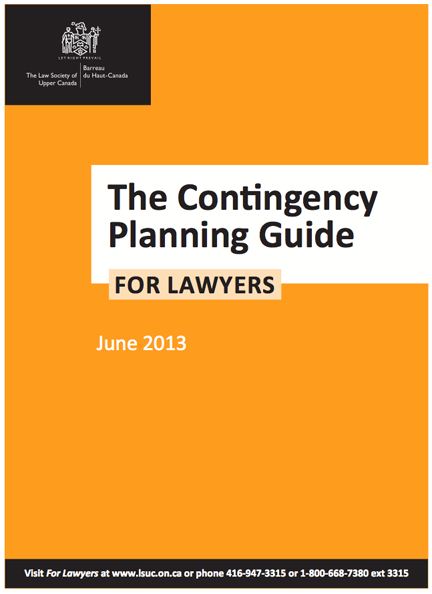With a good chunk of Ontario’s legal profession approaching old age, the Law Society of Upper Canada is urging lawyers to have plans in place for major disruptions to their practice due to serious illness or death.
 According to the law society, sole proprietorships and small firms make up 95 per cent of the province’s law firms, and about 40 per cent of lawyers who work in these firms will reach the age of 70 in the next 15 years. Within the same period, a quarter of paralegals will also turn 70.
According to the law society, sole proprietorships and small firms make up 95 per cent of the province’s law firms, and about 40 per cent of lawyers who work in these firms will reach the age of 70 in the next 15 years. Within the same period, a quarter of paralegals will also turn 70.
Yet, most people in the legal profession don’t know what will happen to their business when they’re no longer around, the law society says, calling the situation one that leaves clients “extremely vulnerable.”
“Succession and contingency planning are important components of sound practice management,” said Diana Miles, LSUC’s director of professional development and competence. “Ensuring lawyers and paralegals have plans in place is a priority for the law society.”
Last week, the law society published a guide to help lawyers through what is likely an uncomfortable, but necessary, planning.
The guide urges lawyer to first select a replacement counsel who will take on their office and work when they can’t.
Step two urges talking with the replacement lawyer to “ensure that they are agreeable to assuming the role,” a move followed by talking to banks to allow the substitute counsel access to accounts in time of death or disability.
“Grant a power of attorney for property to the replacement lawyer and to an alternate replacement lawyer to take control of your law practice and protect the interests of your clients in the event of your disability or unexpected absence from practice,” the following step says.
The guide includes samples of forms needed to grant power of attorney, suggesting that lawyers should have separate power of attorney documents for their personal assets and their law practice.
The law society published the guide on the same day of its June Convocation. Also on Thursday, David Wright was appointed to serve as the law society’s first fulltime independent, non-bencher tribunal chair. His four-year term will begin in September.
The new position was created to “further the law society’s commitment to a hearing process that is transparent, fair, and effective for both the public and the affected licensees,” said law society Treasurer Thomas Conway, who was acclaimed to continue in his position for another year.
 According to the law society, sole proprietorships and small firms make up 95 per cent of the province’s law firms, and about 40 per cent of lawyers who work in these firms will reach the age of 70 in the next 15 years. Within the same period, a quarter of paralegals will also turn 70.
According to the law society, sole proprietorships and small firms make up 95 per cent of the province’s law firms, and about 40 per cent of lawyers who work in these firms will reach the age of 70 in the next 15 years. Within the same period, a quarter of paralegals will also turn 70.Yet, most people in the legal profession don’t know what will happen to their business when they’re no longer around, the law society says, calling the situation one that leaves clients “extremely vulnerable.”
“Succession and contingency planning are important components of sound practice management,” said Diana Miles, LSUC’s director of professional development and competence. “Ensuring lawyers and paralegals have plans in place is a priority for the law society.”
Last week, the law society published a guide to help lawyers through what is likely an uncomfortable, but necessary, planning.
The guide urges lawyer to first select a replacement counsel who will take on their office and work when they can’t.
Step two urges talking with the replacement lawyer to “ensure that they are agreeable to assuming the role,” a move followed by talking to banks to allow the substitute counsel access to accounts in time of death or disability.
“Grant a power of attorney for property to the replacement lawyer and to an alternate replacement lawyer to take control of your law practice and protect the interests of your clients in the event of your disability or unexpected absence from practice,” the following step says.
The guide includes samples of forms needed to grant power of attorney, suggesting that lawyers should have separate power of attorney documents for their personal assets and their law practice.
The law society published the guide on the same day of its June Convocation. Also on Thursday, David Wright was appointed to serve as the law society’s first fulltime independent, non-bencher tribunal chair. His four-year term will begin in September.
The new position was created to “further the law society’s commitment to a hearing process that is transparent, fair, and effective for both the public and the affected licensees,” said law society Treasurer Thomas Conway, who was acclaimed to continue in his position for another year.







